- Home
- Roberto Saviano
Savage Kiss Page 2
Savage Kiss Read online
Page 2
“Stanno arrubbando i bambini! They’re stealing the little ones! Help! Help!” Her voice was growing sharper and louder, like a siren.
“Maraja, pull the trigger, hurry up, they’ve figured it out, put him down once and for all…” But now Nicolas had tilted his head to one side, as if to get a better look at Dentino and ’a Koala’s son. The baby was sleeping serenely, in spite of the pistol: Christian, too—when his mother had brought him home from the hospital, after delivering him—had slept exactly the same way. She would sit Nicolas down in an armchair and then put Christian in his arms, and Christian would just go on sleeping. But all around Antonello, in contrast, the other babies were starting to wake up. In no time at all, the nursery had turned into a hellish cacophony, the wailing of one newborn quickly infecting the one in the next crib, a deafening wave that was enough to stir Nicolas out of his trance.
“They’re stealing the children! They’re stealing the children!” the nurse went on shouting, whirling the IV post all the while, trying to work up the momentum to hurl that stainless-steel javelin with all her strength.
“Maraja, shoot, kill him now!” Tucano shouted. The nurse kept coming closer, and he didn’t know whether to deck her with a punch to the face or shoot her, and if so, whether to wound or to kill. He just didn’t know.
“Maraja, things are going sideways, we need to get out of here. Now. I mean fast, let’s move!”
Nicolas lifted his left hand and touched the tattoo that he’d had done on the back of his neck, so that it could give him strength, confirm that there, too, in the presence of another innocent, what he was about to do was the right thing. For himself, for his mother, for the Piranhas. Because this was the time of the tempest, and he was the tempest that was crashing down furiously upon the city. He pressed the handgun down hard on the newborn baby’s body, and now Antonello started crying, too.
Tucano had retreated, taking one step back after another until his helmet banged against the plate-glass window. “Listen, fatso,” he was saying to the nurse, “I’ll kill you, stay back.” But she kept coming, and two other nurses, summoned by her shouting, had appeared in the corridor. As soon as they saw their colleague, they too started shouting: “Uddio si stanno arrubbando i criaturi! Stanno arrubbando i criaturi!”
“Get back! I’ll kill you! I’ll kill you all!” Tucano was shouting, and now his whole body was plastered against the glass. There was only one way out. He gripped the Glock with both hands now, taking careful aim at the forehead of the nurse with the IV pole.
Boom.
An explosion. Then silence. Tucano looked at his hand, which hadn’t been fast enough to fire.
The bullet in fact had come from behind, shattering the plate-glass nursery window into a hail of sharp-edged fragments, shards that rattled off Tucano’s helmet, glittering on the lab coats of the nurses, who were covering their faces with their hands, bounced off the ceiling, stabbed into walls and floor. When Tucano turned around to see who had fired, he saw Nicolas holding the Desert Eagle still pointed right at what had once been the nursery window. High up on the facing wall was the hole where the bullet had finally lodged. The cries of the babies, which had ceased for a brief fraction of a second, resumed desperately and Nicolas angrily started into awareness: “Come on, come on, get out of here.”
Just like on the way in, they crossed paths with no one. They descended the broad steps of the Polyclinic, and then the steps that led down to the lobby. There Nicolas twisted the throttle all the way to barrel through the security guards who were struggling to draw their guns and the firemen with gas masks on their faces. The last person they roared past was the male nurse who had let them in in the first place, but his eyes were glued to his iPhone and he didn’t even notice them going past.
* * *
Nicolas returned home just as his building was emerging from sleep. He heard the showers running, parents calling to children to get moving or hurry up, that the school gates weren’t about to wait for them to wake up. Only his own apartment was mute and deserted. His mother was already at the laundry and pressing shop, every morning she got there a little before opening time; and his father had moved out right after Christian’s death, he’d left the house with them to go to the funeral and then he’d never come home. They could live without him, though; his father didn’t make the difference—he never had. Nicolas’s mouth twisted in a grimace, he tossed the keys onto the table and turned on the television set. The volume was turned down all the way, not even the morning news dared to break a silence that smacked of reproof. Trailing after the segments about local politics, on-screen there were images from the hospital, the shattered plate glass, the nurses taking newborn babies with convulsive bawling faces out of their cribs and carrying them off, tire marks on the floor. “Hooligan Pranks at the Polyclinic,” read the banner graphic on the TV screen. A minute later the report was over, the time you’d devote to a stupid stunt.
He reached his bedroom, lay down on his brother’s bed, and knitted the fingers of both hands together behind his neck, allowing his fingertips to trace the name he’d had tattooed there: Christian. A meticulous braille-reading of the name, back and forth, and then again, a circumnavigation of the oval outline of the hand grenade, and then, slowly, he repeated the process. He’d insisted on having the hand grenade exactly the same as the one on his chest that enclosed his name, Maraja, an identical twin tattoo.
What have I done? he asked himself. He stuck both fists into his eye sockets and started digging.
Cat and mouse. A furious cat on the hunt for a phantom mouse.
The piazzas were thriving. Coke was moving briskly. They had no trouble selling Scignacane’s heroin. The monthly take from the protection racket was coming in on time. The sun shone on the Piranhas’ territories, in the center of Naples. But Dentino was still alive, and Nicolas simply couldn’t make peace with that idea. It was like a backache that just wouldn’t quit, a cavity in a tooth that torments your sleep: the traitor was still somewhere in the city, hiding who knows where.
For the past five months, he’d been wearing himself ragged, on endless stakeouts. He’d begun by setting up an ambush outside the courtyard of the parish church. That rectangular patch of dirt still bore the marks of their soccer matches. Then he’d spent night after sleepless night outside the dentist’s office where Dentino had spent his first month’s wages on whitening the teeth that smoke and drugs had blackened. Then his parents’ apartment, the apartment of his maternal grandparents, then that of his paternal grandparents, and Capodimonte Park because someone said that they’d seen him sitting on a bench there, and finally the train station, because it had just struck Nicolas as a logical option to give that a try. Homeless bum by homeless bum, toilet by toilet. Tightly pinching his nose shut, he’d turned over those worn and weary men sleeping in their rags. At the apartment where Dumbo’s mother lived, he’d devoted a full week of continuous stakeouts, ready to ambush him at any time of the day or night, confident that sooner or later that traitor would give in to temptation. But he’d come away empty-handed.
The mouse hadn’t shown itself anywhere, so he logically had to crush the baby mouse. But he hadn’t been able to do it … Come si accide ’nu criaturo? How can you kill a baby?
“That’s enough,” shouted Nicolas, “that’s enough.” A single movement, his arm sweeping away everything. Saint cards, holy cards, cards of the Madonna, San Gennaro, Padre Pio, photographs of Christian at his first communion, in a swimsuit beside him on a beach of which he had no memory. He looked down at the clutter of objects at his feet, then he took off shoes, trousers, and sweat jacket. After that, he pulled the blanket aside and slid under the sheets, holding his knees up with both arms. And then he finally made up his mind to do what he ought to have been doing for some time now.
He started crying.
QUICKSAND
A wasp’s nest. Nicolas could hear them swooping around his head, and without opening his eyes, did his best to wave the
m away with wide sweeps of his hands. Then consciousness took over. Nicolas opened an eye. Wasps? The old Motorola StarTAC cell phones that he and the paranza used as burner phones. Impossible to bug or hack. Who could say how long they’d all been sizzling away on the desk.
He leaped out of bed. He’d slept the whole morning away, and part of the afternoon, but his sleep had done nothing to refresh him. He splashed icy water on his face, then pulled the hood of his sweatshirt over his head, as if that could protect him from the pain that was rising in the back of it. One of those splitting headaches that focus on a specific point, an infinitesimal dot, and then dig in deeper, scraping and shoveling like a sadist with a fine-point drill bit. When he was little, if he had a fever or a tummy ache, his mother, Mena, would mix up a glass of water, lemon, and sugar. That was her universal remedy: that, she said, would cure whatever ailed you.
But Mena wasn’t there now, and first he’d thought of chasing the pain away with a joint, then with a line of coke, but in the end he’d opted for a strong espresso and a text to the whole paranza: he wanted them all at the private room, at five on the dot, they had a lot of things to talk about. Even if he actually didn’t much feel like talking, and after all, he had nothing to say. He just wanted to bathe in the hail of words from his team, in the hope that those words would push back that thing he could sense under the buzz of that fine-point drill bit. A clot of helplessness and dissatisfaction with himself, and the more time he spent alone, the more it continued to grow.
* * *
The New Maharaja was still under renovation. Or at least that’s what the proprietor, Oscar, told the people who showed up outside the club every evening. A total embargo. He’d walk over to the people who stood gazing up at the scaffolding that concealed the white of the façade, and, resting his hands on his flaccid belly, Oscar would swear to each and every one of them that when the club reopened, they’d find an even more magnificent New Maharaja. The “renovation work” actually consisted of nothing more elaborate than a coat of white paint and a wax-and-buff of the dance floor—but Oscar was counting on expectations to do the work for him. He was counting on mirages.
For the Piranhas, though, the New Maharaja was always open, even when it was closed.
Oscar saw Nicolas’s TMAX arrive, cruising along at an unusual velocity, placid as one of those big cruise ships that you could admire from the balcony of the New Maharaja. He watched him abandon the scooter like any old piece of junk and continue straight ahead on foot without so much as a glance at him or either of the two young women he was talking to: both blond, tall, very young.
“Maraja”—he tried to detain him for a moment—“come here, let me introduce you to the new dance corps.” But Nicolas didn’t even hear him, he just wanted to get to the private room, lie down on one of the little settees, and maybe get a few minutes alone in the dark before the others arrived. He tried to put his priorities in some kind of order, after his failed raid on the hospital. Talk to Tucano? Make it clear to him, with kind words or threats, that he mustn’t breathe a word to the others of what had happened? Or else confront Mena, tell her about his failure? Because there really was no other word to describe it. Maybe she already knew all about it, maybe she hadn’t missed the report on the local news.
The first one to arrive was Lollipop, followed by Briato’. His old friend from mini-soccer still had a very visible limp. After being broken in four places, his leg had never quite healed right, and the doctor had told Briato’ that he would limp for the rest of his life. Still, he didn’t make too much of a big deal about it, and, in fact, if anything he overdid his walk, “De Niro style.” In the gloomy cavern of the private room, they couldn’t spot Nicolas right away, over where he sat bent at the waist, with both hands pressed against his temples. Nicolas was seated on his throne, so that the others would see him exactly where he belonged, but he simply hadn’t been able to bring himself to turn on the lights.
“Maraja, where are you?” shouted Briato’.
“I’m right here,” said Nicolas. “Why are you shouting?”
Lollipop flopped down on the little sofa, while Briato’ switched on the lights, filling the room with a blast of artificial daylight. A glaring white sun exploded behind Nicolas’s eyes.
All it took was a vicious glare from Nicolas, and Briato’ switched the light right back off, returning the room to darkness. One by one, the others drifted in. The last to arrive was Drago’, who sat down next to Drone, reassembling the old hemicycle that right there, on that spot, had first officially sanctioned the distribution of the piazzas. They were so many colorless silhouettes now, more or less dense according to the quantity of light that they were able to capture as they moved. Only Nicolas, sunken in his throne, seemed to have lost all features of his lithe physique.
Biscottino couldn’t seem to keep his hands still. They rustled in the darkness, in time with his words: “Maraja, how come all this darkness? Doesn’t Oscar pay his electric bills anymore?”
“That guy never paid a bill in his life,” Pesce Moscio piped up. “They just tied his power line into the apartment house next door.”
The ensuing laughter was a wave of needles that drove into Nicolas’s skull, but he said nothing. Needle by needle, his brothers would cure him.
“But did you see the two big blond ladies out there? Oscar must need a ladder to fuck them…” said Lollipop.
More laughter, more needles, and already he was feeling a little better. It was the usual ritual for which he had always been the master of ceremonies: first the bullshitting, then the tide of wisecracks would subside and at last they’d come to the important matters. The piazzas. The money. Their kingdom.
At first, it had been a genuine boom. Prices that low had never been seen before—in Forcella it seemed like Christmas every day. Everyone came to the neighborhood, even from as far away as the provinces, and the Piranhas regularly ran out of narcotics in a single morning and had to arrange for a speedy resupply. Everything had gone as smooth as silk, and the line of customers had turned into a mob. Drone had appointed himself the chief logistics officer of the operation—he was in charge of crowd management. He’d managed to get his hands on his own tally counter, like the ones that airline personnel use during boarding procedures, and he’d rush from one piazza to another. Clackety-clack, clack, clack. He’d set up in a corner and with every person that walked past to buy drugs, he’d lower his thumb. Clack. When there were too many customers, he’d arrange to interrupt the stream somehow, or else quickly order a resupply. The tally counter had become an extension of his hand, and even when he was at the New Maharaja, you could occasionally hear that clackety-clack, clack.
“On my patch, there’s nothing left,” said Tucano. “I can’t hold on to them. They want to go back to selling Micione’s shit. I can’t hold on to my dealers.”
The euphoria had waned over the course of the last three months. At first the merchandise that the Piranhas were pushing had sold like hotcakes, but now they were running out of product. So the managers of the piazzas had made the sober decision to turn back to their old supplier, who’d taken advantage of the opportunity to flood the market with tons of his shit.
“Same thing in San Giorgio,” said Lollipop. “You know what they used to call me, until just last week? Don Vince’! You get that? But now that we’re running out of product, they’re going back to what they’ve always done. They talk to Micione and we go back to being the fucking last of the brothers.”
“Lollipop,” said Drago’, “your problem is you don’t try to figure things out.” He went over to Lollipop to give him a pinch on the cheek, but Lollipop dodged aside and the two of them tangled up in a gentle wrestling match, without real effort, to such an extent that to Nicolas those bodies momentarily reminded him of a video of kittens—or were they bear cubs?—that Letizia had posted. Just as quickly as they’d come together, the two young men broke apart and Drago’ sat back down.
In a throbbing voice, burs
ting with satisfaction, he described how he often had to turn customers away, he had so many of them at Vicaria Vecchia.
“I just doubled the price,” he explained, “and the product moves more slowly but that means the dealers keep their mouths shut.”
“Fuck, listen to him, the businessman!”
“Holy shit! You blew them away!”
“Yeah, but that way they make less money,” said Tucano.
“They make less money, maybe a little slower,” Drago’ conceded, “but then they’re not stuck between a rock and a hard place.”
“Ua’, nice, Drago’,” said Biscottino, “the rock won’t budge, and the hard place either. Ua’, that’s what’s great about the Vesuvio district.”
If Nicolas had opened his mouth, he would have said that it really wasn’t a joking matter. They were caught in quicksand and they were going down. One piazza after the other, they’d all go down, some sooner, others later. Maybe a few would keep control over a street here and a street there, but they’d eventually be suffocated between Micione’s firepower and the fate that awaits those who have never even looked their supplier in the face. L’Arcangelo’s supplies were down to their last scrapings. Nicolas knew that and so did the others, but no one had the courage to say it out loud. Certainly, Scignacane’s heroin continued to arrive, as regular as clockwork, but it alone wasn’t enough to assure the loyalty of the paranza’s piazzas.
That’s what he ought to have said, but his headache wouldn’t let go. So he said nothing and limited himself to keeping an eye on Tucano, who in turn kept his eyes downcast. Was Tucano waiting his turn so he could reveal what Nicolas had been unable to do in that hospital, waiting his turn to denounce Nicolas’s weakness? All it would have taken was a single word and then, So long, Maraja. I would have done it, he thought, so why doesn’t Tucano say anything? Didn’t he want a paranza all his own, too?

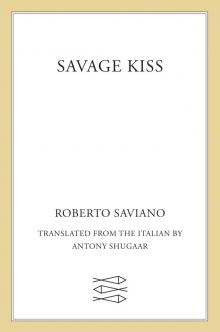 Savage Kiss
Savage Kiss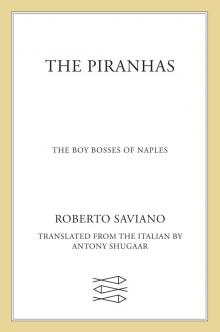 The Piranhas, The Boy Bosses of Naples
The Piranhas, The Boy Bosses of Naples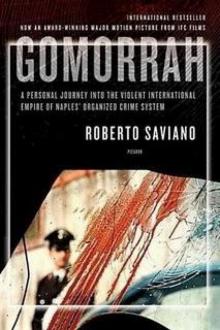 Gomorrah
Gomorrah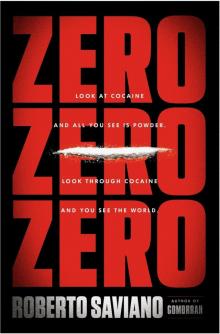 ZeroZeroZero
ZeroZeroZero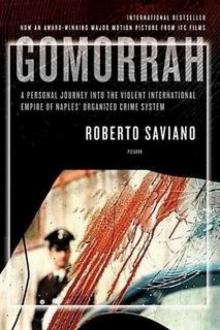 Gomorrah: A Personal Journey into the Violent International Empire of Naples’ Organized Crime System
Gomorrah: A Personal Journey into the Violent International Empire of Naples’ Organized Crime System